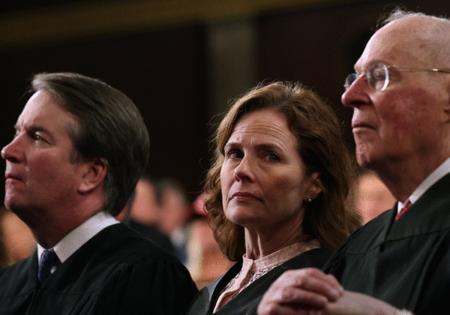Editorial: What Justice Amy Coney Barrett's words on disagreement can teach us
Published in Political News
Rodney King’s famous line “Can we all get along?” feels more relevant than ever today, underscoring our highly regrettable departure from civility toward a more belligerent and uneasy political reality.
But every now and then, we see small but significant signs that there’s movement toward reviving civil discourse. One of those moments recently took place here in Chicago.
Supreme Court Justice Amy Coney Barrett on Monday joined other members of the bench and bar at the Seventh Circuit Judicial Conference at the Swissotel and praised her peers for their collegiality.
“It occurs to me that law is a profession that, unlike some others, operates continually through the strain of disagreement,” she said.
“Doctors cooperate and coordinate to deal with patients. Engineers work together to build the bridge. But litigants and their lawyers are pitted against one another on opposite sides of the ‘V.’”
Here was the part of her remarks that most hit home with us: “We know how to argue, but we also know how to do it without letting it consume relationships.”
The legal profession has long operated this way. That it continues to do so despite mounting partisan pressure is an example worth noting for the rest of us.
Coney Barrett, of course, is no stranger to vitriol. The justice, who joined the high court in October 2020, was called a “religious bigot” and a “monster” during her confirmation hearings.
Her family, too, has endured attacks — from criticism of her adopted children to a bomb threat against her sister earlier this year.
Point is, she’s dealt with fierce criticisms and personal attacks directly. Yet here she stood, speaking with all sincerity about the importance of respectful discourse.
We encourage more officials to take this tone — not just at the lectern but in their daily dealings, setting a model for how the rest of us navigate politics.
Our current political climate is particularly dangerous because people have started viewing anyone who disagrees with their politics as evil or less than human. And when you dehumanize people in this fashion, it becomes OK to hate them — or even hurt them.
Too often, that mindset fuels violence. In June, a gunman killed former Minnesota House Speaker Melissa Hortman and her husband, Mark, in their own home. Politically motivated violence is a scourge that must end.
We need to reestablish that disagreeing with people on politics doesn’t mean hating them. That’s not to say we always should agree or that there’s never room for heated exchanges. We wholeheartedly support championing the causes in which you believe. Indeed, sometimes moral outrage is justified.
But we don’t have to be morally outraged every single day, and if your moral outrage leads you to hate other people, maybe it’s time to reevaluate. That was the deeper point of Barrett’s reminder: Disagreement need not destroy relationships.
If judges and lawyers can argue without contempt for each other, then those of us in walks of life that don’t routinely entail intellectual combat can do the same.
___
©2025 Chicago Tribune. Visit at chicagotribune.com. Distributed by Tribune Content Agency, LLC.
























































Comments